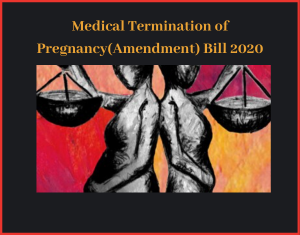
The lower house of the Parliament passed the Medical Termination of Pregnancy (Amendment) Bill 2020 (hereafter Bill) in the current budget session on March 17, 2020. This bill amends the earlier Medical Termination of Pregnancy Act 1971. Some key features of the new Bill include: Extension of the gestation period for termination of pregnancy from 20 weeks to 24 weeks, directions to constitute a Medical Board in every State and protecting the privacy of women whose pregnancy has been terminated.
Though this amendment is a step in the right direction, there is still a long way to go to in realising women’s reproductive rights. The Bill proposes to increase the upper limit for termination of pregnancy from 20 weeks to 24 weeks. However, from sub-section 2. (b) of the bill, it appears that this extension of the limit will only apply to special categories of women. The “special categories of women” include rape survivors, victims of incest, the differently-abled and minors, Health Minister Harsh Vardhan said while moving the bill.
According to the explanation to sub-section 2, the upper gestation limit will not be applicable in cases where the termination of pregnancy is necessitated by the existence of any foetal abnormalities, diagnosed by a Medical Board. This differentiation is unreasonable as technological advancements allow for several foetal abnormalities to be detected even after 20 weeks, which may transform the desired pregnancy into an undesired one.
On the face of it, the ‘right to abortion’ needs to be provided to a woman ‘on-demand’ as long as the woman’s health is not at risk. The arbitrary classification reflects the regressive mindset towards women’s rights over their bodies to go choose what they wish with regards to the foetus. It also reinforces the patriarchal system in which women are not given agency to decide on matters relating to their family progeny and their bodies.
Denying the ‘right to abortion’ to women is a violation of Article 21(Right to Life) of the Indian Constitution. As Supreme Court in its Suchita Srivastava judgement delivered in 2009 said, ‘There is no doubt that a woman’s right to make a reproductive choice is also dimension of ‘personal liberty’ as understood under Article 21. It is important to recognise that reproductive choices can be exercised to procreate as well as abstain from procreating.
Though one of the provisions of the Bill talks about safeguarding the ‘right to privacy’ of women who have terminated their pregnancies, it falls short of achieving the core aspects of the ‘right to privacy’. Denying women to make reproductive choices is a violation of ‘Right to Privacy’. In 2017 Puttaswamy judgement, the Supreme Court declared that privacy safeguards ‘individual autonomy’ and recognizes the ability of the individual to control vital aspects of her life. The pursuit of happiness is founded upon the autonomy and dignity of the individual. If women do not have a say in deciding what happens with her body when she is pregnant, her bodily integrity is violated.
Abortion jurisprudence of the Supreme Court is based on the recommendations of Medical Boards and not on the women’s choice. And there have also been cases where the decision taken by the Medical Boards are very subjective influenced by social and moral norms and not on the medical factors concerning risk to the life of the women or foetus. Rather than facilitating women to take the decisions, institutions are seen as the primary decisionmakers. Therefore, we need a more progressive abortion law which allows women to make conscious choices about the termination of pregnancy until 24 weeks without any special conditions.
This blog is authored by Ritambhara Singh.

